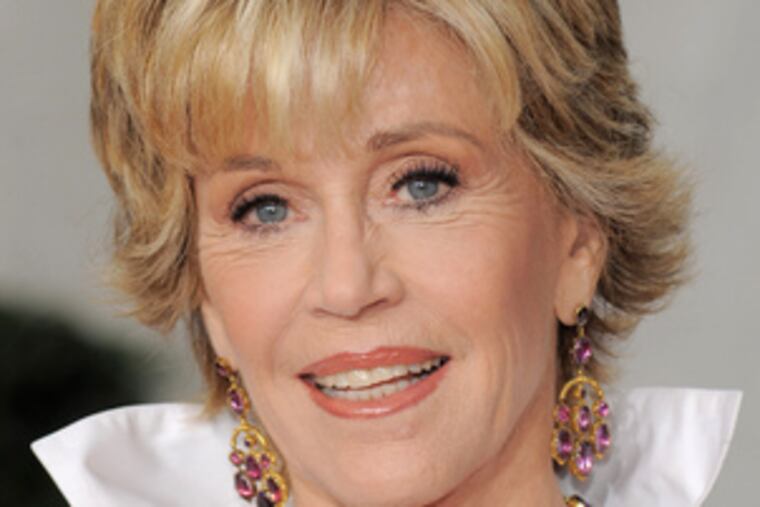Jenice Armstrong: Jane Fonda: Eating woes
PROVING YET again that money, fame and beauty don't amount to squat when it comes to happiness, Jane Fonda was in Philly Friday talking about her life-long struggles with anorexia, bulimia and self-image.

PROVING YET again that money, fame and beauty don't amount to squat when it comes to happiness,
Jane Fonda
was in Philly Friday talking about her life-long struggles with anorexia, bulimia and self-image.
She's on the other side now and was at a conference sponsored by the Renfrew Center, an eating-disorders clinic, to share what she has learned.
"I had to move toward the light or succumb to the darkness," she said of her turnaround.
A lot of what the Academy Award-winning actress revealed has come out before. Fonda's memoir, "My Life So Far" (Random House, 2005), went into her issues with romantic co-dependency, her chronic feelings of inadequacy and her misadventures in political activism. Fonda is pretty expansive when it comes to sharing her feelings.
But it's a whole other thing to be in the room as Fonda, who seems finally to have navigated the long journey from her dysfunctional childhood to a career in Hollywood to a place where she now feels whole, laid herself bare before an audience full of psychiatrists.
Scarcely anyone moved while she spoke. Fonda, who's now 71, was raw. She was open, disclosing how her mother, Frances Ford Seymour, had been sexually abused as a child and had undergone six abortions and had plastic surgery before giving birth to Fonda. Seymour committed suicide when Fonda was 12.
Fonda pointed to her emotionally distant father, the late Henry Fonda, and his needling her about her weight, which she said kick-started her obsession with thinness. Fonda, who in 2001 founded the Jane Fonda Center for Reproductive Health to stem teen pregnancies, calls what happens to adolescent girls that makes them take a step back from their authentic selves as "losing their voice."
"I saw that to be loved, it was best to be perfect," she said of those years. "The tyranny of perfection attached itself to my body . . . I wasn't thin enough.
"The truth of the matter was I was never fat," Fonda added. "[Yet] just sitting down at a table would cause me to have an anxiety attack."
Fonda's bulimia and anorexia continued through most of acting career and spanned her fitness-guru phase. She wasn't able to stop her disordered eating for good until she was in her forties.
But after years of therapy, a religious conversion to Christianity and discussions with various spiritual leaders, Fonda has figured out that "perfect is for the divine, for God."
She has gone through the proverbial fire and come out on the other side - stronger, confident and less concerned with pleasing others, particularly men. Regardless as to what you think of Fonda's politics, this Hollywood icon's tortured journey from co-dependency to wholeness is noteworthy - if for no other reason than what it can teach about the process.
"I have one hip that's fake. I'm soon about to have another knee that's fake," she said. "But there's all this other stuff that gets better if you allow it.
"One of the great things about getting old is that some things just aren't as important and other things become really important," she said. "You go deep. You stop living laterally and you go deep."
These days, Fonda's working on a book about aging, "The Third Act: Entering Prime Time." She also has been asked to star in a Broadway play about a musicologist with Lou Gehrig's disease. The role calls for Fonda to sit onstage nude - something that still gives her pause.
Yes, the more some things change, the more they stay the same. She admits as much. "I love the idea of being airbrushed, so that just tells you, you're never 100 percent." *
Send e-mail to heyjen@phillynews.com. My blog: http://go.philly.com/heyjen.